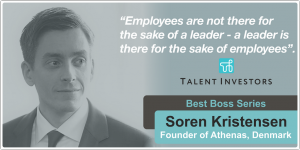Soren Kristensen is the founder of Athenas, one of the largest speakers agencies in the world and the largest in Denmark. Today Athenas and A-Speakers are present in 7 countries and represent thousands of speakers across the world. The companies have won a series of awards throughout the years. Aside from running Athenas & A-Speakers Søren Kristensen is also the founder of Tikko – a company doing open seminars in Norway, Sweden and Denmark and an active investor in companies like GoLearn & Coworking Plus.
What do you think are the prerequisite qualities of a successful leader?
A lot of the qualities can be learned – however, a prerequisite for successful leadership is empathy and a genuine interest in your fellow humans. All tough decisions should be a hard choice. We say at Athenas that if you can fire a person without it being tough – you should probably not be a leader
The most important prerequisite would be an ability “to navigate complexity”. You must be capable of navigating your company in a world as complex as today’s world. In this regard, I am inspired by Nassim Taleb’s “Black Swan”.
When in your career did you find you really began to be an impactful leader and what gave you proof of this?
I’ll let my colleagues judge whether I am an impactful leader but being the founder of the company and having built it from nothing makes the role of its leader both natural and easy as the company exists because of this endeavour.
There is definitely a truth in people telling you that the biggest difference is when your organization reaches a point where you cannot directly lead all the employees. That was one of the biggest transformations,
We have a very, very low turnover and only a handful of people left the company in over than 12 years and we are a business with 100+ employees, which I hope is proof of the strong bond and strength of the company. I would hope that the enthusiasm and the spirit that founded the company is still a part of its DNA. Along the road, this spirit merged into the personalities of all the people in the organization and in that way creating something entirely different and often stronger.
Share with me your greatest leadership success/experience.
It is hard to qualify a single experience. The best testament to good leadership is to see how your colleagues greet new colleagues.
I am the proudest of our gatherings and parties where I see a happy group welcoming newcomers. I cherish many great memories of us working and laughing together, it’s a very relaxed and informal office.
Recall your biggest managerial challenge. Tell me how you handled this. What did you learn that you might do differently next time?
Probably the point when we grew beyond 20-30 employees. As the founder of the business, you have the privilege of leadership as you are the reason that the company started in the first place. Therefore, it was hard (both for me and the organization) when we grew and needed an extra layer of leaders. I felt that I lost contact with both people and a lot of day-to-day tasks, yet it was necessary to do it. It took a few years to adapt.
I would probably do a lot of things differently and I would not be so optimistic about the time spend navigating these processes.
I have a developer who always says that you should multiply any time schedule for an IT project with Pi. The same could be said about leadership processes.
Who has been your greatest mentor(s)? What about this person or the experience had the biggest impact on your growth?
I am, of course, influenced by many, many different things. For instance, I have already mentioned “The Black Swan”. Not the book in particular but the notion of complex causality. Something that even when writing this makes me question my own answers. I am always afraid that simple explanations (which is what you can do in an interview) hurts more than it helps as the advice might have only worked in a particular spot in time and space and not for everyone else.
Common opinion states that in order to succeed in business one has to be ruthless. A quick survey of world’s most domineering companies seems to support that view. Do you think it’s possible to be very successful in business and still be a nice/kind person?
I definitely hope so. I hope that you can have success as a leader and still look yourself in the mirror every day. I try to! With that said I have definitely faced new challenges as the company grew bigger and just as much as I try not to be ruthless it becomes increasingly difficult with bigger organizations and bigger responsibility. I am happy not to face some of the decisions that multi-billion-dollar companies with thousands of employees must face. To fire 100 to save the jobs of 200 – to close entire departments to live up to demands from stockholders, etc. So just as much as I work on maintaining my humanity I can understand that it could be difficult the larger the responsibility.
Let’s talk about managing pressure – how do you control your own emotions and temper when things don’t go to plan? Not lashing out at those around you is a skill – what are your tips?
I think that as one of my most inherent traits. It very, very unusual that I become a slave of my temper. I work with speakers and celebrities and have done for many years. Patience and a cool temper is a big upside.
It is one of the leader’s most important traits – to keep calm and not say something that you will regret sooner. Always remember that your words are taken more literally than you think so think twice before bursting out.
The most important part is to step out of your own situation and try to picture you being the other person. It sounds simple, but you really need to try to be in their position and in their circumstances. It often gives people a sense of “ah ok – I can see why this matters so much for this person”. For example, when we work with a speaker on an exclusive basis – if we fail in selling that speaker it might affect our company within a small percentage, but for that speaker, it is perhaps up to 100% of their income. So of course, little things will be more important for them – we need to remember that again and again.
At times, we all hit a low point. How do you motivate yourself?
In certain situations, I can be the worrying type, but I have a lot of tools that work for me. It has a lot to do with summing up what really is at stake. At times you think that everything will fail miserably, but if you try to sum up what the worst that could happen, and what you would still be left with – your family, home, loved ones, health etc. In the end, it is “just” work – for entrepreneurs, too. I do not buy the whole “do or die” attitude of entrepreneurial motivational gurus.
What are your top three book titles that you were most impactful for your leadership development?
1. A Danish book by an old friend Peter Bastian, who was a well-known theoretical philosopher besides from being a musician and physicist. He wrote a book called “Master Teacher” (my translation from the Danish title “Mesterlære”).
2. Afore-mentioned “The Black Swan” by Nassim Nicholas Taleb.
3. “The Everything Store” – a biography of Amazon and Jeff Bezos – perhaps, not the book in itself but the mindset and theory used by the company.
Most large organisations today have a strict bonus and pay raise policy, which makes it difficult to reward people even when you know they truly deserve it. Have you found a way of dealing with this?
It’s got to be a combination: in some areas, bonuses and pay raises are important on an individual basis while with some groups you should do everything team-based. You do not necessarily get better employees or more dedicated people with high salaries. It is important to remember that choosing what seems like an “easy solution” – throwing money at people – is not always the best thing.
Companies often refer to themselves as “family”, yet only a few support their employees like a family supports its members – unconditionally. Aside from professional training, what support do you offer your employees?
This is actually a bit of a quagmire. We have also spoken about ourselves as a family but now I am doing it less and less frequently. As you say, a company cannot support employees unconditionally, and, in my opinion, it should not. What if an employee does not do their job well at all? What if a person disrespects the colleagues or their work by not doing theirs? What if your colleague becomes an alcoholic or violent? You cannot support them unconditionally or you will lose their co-workers that have to pick up after them. I think the family analogy is a bit dangerous and often used by companies to signal something that they cannot and will not abide by anyway. You cannot fire or leave a family (at least at a root level) but you can fire people and they can leave, too.
Some managers believe in a strict hierarchy and the “do what I say approach”, sighting cultural norm as an excuse. What are your thoughts on this?
I am not a fan of this. You need to trust your colleagues and try to guide them as well as possible, but we do not have a strict hierarchy, not at all. Everybody should know who his or her boss is, otherwise you will create insecurity and other problems.
I used to say that leadership is like an IT department. It is a support function.
Employees are not there for the sake of a leader – a leader is there for the sake of employees. Leadership in itself does not create or sell any products.
Tell me how you decide what to delegate and to whom.
Passion, ability, likability – it is hard to describe as it varies from situation to situation. If you are motivated to lead, that is a good start. It‘s much better than a person with all the right skills, yet lacking the last inch of motivation.
Team building has become a buzzword in the corporate world, yet many still do not see the value in applying it to their group or organization. What are your beliefs and or successes around team building?
I strongly believe in team building…if done right. You need to plan it well and have an actual goal for it instead of going into the woods because a consultant said so. How does it fit your company’s profile and are you sure that team building will motivate your group? Some team building events actually end up creating separation and groups within a group by ousting some members during the event. That is, of course, both dangerous and hurtful. Strategy seminars are great if put together with a bit of thought – you create groups and give them the opportunity to brainstorm. You often find out that inspiration comes from unexpected angles. Cooking classes are great too if made only with a focus on entertainment and not on making the best food in the world. Going out to keynote events together is also a good team building method.
When it comes to morning or weekly briefings do you conduct those in person or via a memo?
Almost always in person – I do Skype talks with the country managers outside the office and have a long Monday running meetings with all departments about the week that went and the week ahead.
How do you decide to be available to your team (i.e. text/Email/voice call/video call)? How do you determine the best way for them to contact you that does not interrupt your workflow?
During the work hours, I am available when not in meetings. I forward all the emails that require more time to work on to another email address that I answer from home. After I became a dad I try to close my mail and phone from around 5.30pm till the baby goes to bed at 8 pm.
How much do you value transparency of information at work? To what extent do you share information with your team?
In some areas, everybody knows everything, but when it comes to, for instance, information on new competitors, I try to figure out the situation as a whole, before involving everybody thereby giving them unnecessary stress.
How do you best separate work life from personal life – for a healthy balance? What are your biggest challenges around this? How does this impact you personally?
I never talk on the phone when entering my house as I have a 2-year old daughter (and one aged 4 months) and she cannot understand why her dad cannot spend time with her when he comes home. So I stand outside and finish my calls and I do not answer my emails until after she has been tucked in at 8 pm.
Explain how you work with HR for recruiting and interviewing. What works for you and how do you handle the interviewing process for vetting candidates?
Normally we let the individual leaders do their own interviews and screening. HR only helps with the practical part and joins for interviews if requested. We do not have a big HR department, and this is a part of our philosophy – leadership and human resources are important to be handled close to home, as it is dealing with people and personalities, rather than something that should be handled further away in a larger department. I am aware that it will probably change with a bigger organization.
I definitely have a very loose interview type and sometimes perhaps too loose. I look 90% culture, personality, fire within – and 10% skills. I really love having it that way.
How do you respond to employees/colleagues who are diagnosed with mental disorders, e.g. depression or anxiety?
I have only had a few of these cases but we take them very seriously and with a lot of consideration. We have had instances when we have had to send people home with symptoms of stress or depression and have had long and hopefully productive conversations with them. I have found that it’s often better for a colleague or middle-manager to handle these talks as people have a tendency to downplay things when talking to senior management.
Sometimes an employee is not working out despite your best efforts and you know that this relationship is not serving them or the business. At which point do you decide to part company and how do you go about it?
It is always, and should always be, a tough decision which requires a lot of pondering. As mentioned earlier, if firing someone comes easy to you, you should probably not be a leader. The specific point of no return varies, but there are situations where you need to act quickly as in cases of deceit and hurting your colleagues intentionally. I am always thinking of the person’s future.
If you have put this person in a box where you cannot see them advance further in the organization or see a long-term future for them there, then you are obligated to act and not make them waste some of their precious life working with you. We should always be aware that every hour someone works for or with you – that is one hour they cannot spend on anything else.
What vision or goal are you working towards in your career? What accomplishment would you like to retire with?
I do not think that I can answer that yet – I do indeed have a lot of visions, but they have a tendency to change over time and all the time. I have new visions now after having become a father 2 years ago for instance. For me, it is important that we gave our best shot and that later I can look back and say that we aimed for our goals instead of settled. At the same time, the most important part would be that this is achieved not at all cost but while preserving the ethics and moral throughout the course.
I definitely have some big dreams involving making the planet a better place!





